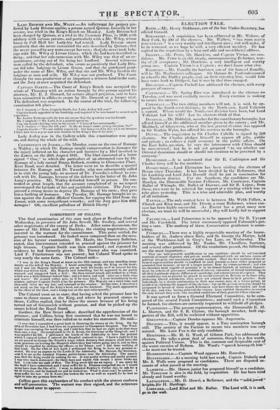COMMITMENT OF COLLINS.
The -final examination of this man took place at Reading Gaol on Wednesday, in presence of Sir John Sewell, Mr. Swabey, arid several other magistrates of the county of Berks. After some discussion, the names of Mr. Elliot and Mr. Buckley, the visiting magistrates, were inserted in the warrant for the commitment. This point settled, the prisoner was introduced. He looked more composed than on the occa- • sion of his former examination. Mr. Maule, the Treasury Solicitor, stated, that Government intended to proceed against the prisoner for high treason. Captain Smith was then examined ; and repeated the evidence he had formerly given. Mr. Turner. also was examined. Lord F. Fitzelarence was not present ; but Colonel Wood spoke to very nearly the same facts. The Colonel said— "I was in the King's Stand at Ascot on the 19th instant, and Was standing imme- diately on the lett of his Majesty. I heard something strike the King on the head ; arid- saw his- Majesty immediately put up both his hands, as if to recover his bat, which was driven back. His Majesty said something, but he appeared to me partly stunned. and staggered back a littl He then turned round; and walked to a chair, which was a little distance behind him ; and s-it down, and said, ' (ive me a little what and water.' Ile seemed ratIMr pale. as if he were faint. I went immediately to the wintlovr, and saw Captain Smith seize the prisoner. •His Majesty sat a short time, and then said. • Give me my. hat.' and returned to the window. At this time. I observed a red mark on the top of the King's head, not on the forehead. The mark appeared to be the effect of the blow, and a hump ruse on the spot subsequently."
The Colonel went on to state, that having asked the prisoner how he came to throw stones at the King, and where he procured stones to 'throw, Collins replied, that he threw the stones bemuse Of his being turned out-of Greenwich without pension, and that he picked up the stones behind the Royal Stand.
Gardner, the Bow Street officer, described the apprehension of the prisoner; and Collins, being first cautioned that be was not bound to criminate himself, Was then called on to make his statement. He said-
st own that I committed a great fault in throwing the stones at the King. On the :16th of December last, I had been an impensionei in Greenwich Hospital. The Ward- keePer was sweeping the ward up, and I told him that he had no right to. do that more than once a day. lie complained to Sir R. Keats; the Goveruor of the Hospital; and I wasexPelleil for life. I petitioned the Ldrds of the Admiralty to have the pension which I enjoyed before I entered the Hospital restored to Inc. I have'a right-to it by an act passed in George the Fourth's reign. which declares that seamen shall have the same pensions owleavingsbe Hospital which they had before going into it, unless they should be expelled for striking the officers, or for felony; and I had done nothing of that kind.- On the 19th of lost April, I petitioned the King to have my pensiou re- stored. He sent an answer to the Lords of the Admiralty. Mr. Barrow. the Secretary. sent it to me at the Admiral Dittman public-house, near the Admiralty. The answer 1%113, that the King would do nothing for me. It was partly written and partly printed. I was very much distressed-for three days and nights this month I never broke my first. I cart take royeath °Mat. The king never did me an injury. I am sorry for the fault I have committed, and I must suffer for it. Distress compelled me, or I would neves have done the like of-it. I went to Admiral Rowley's Vother day, to ask for a bit bYSietuels; and he'daraned me and he kicked me. What is done can't be undone. I Must suffer the law. sir It. Keatsbas broken the law as well as mysel& for he had no right to take my pension [reunite."
Collins gave-this explanationof his conduct with the utmost eoolness . . and Self-possession. The warrant was then signed, and the witnesses
were hound veer to-appear. • -.. -


























 Previous page
Previous page